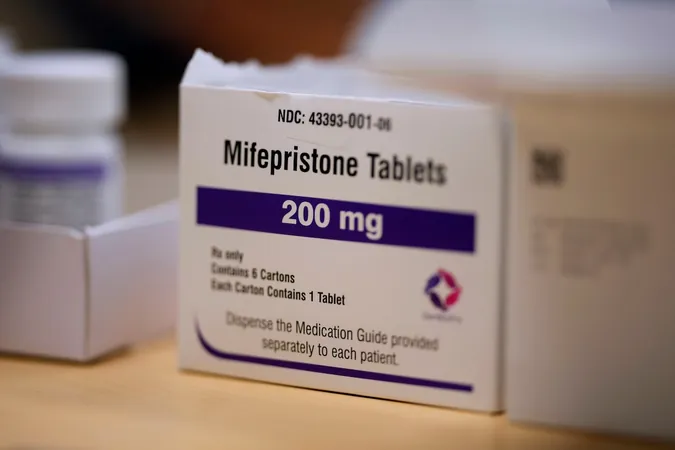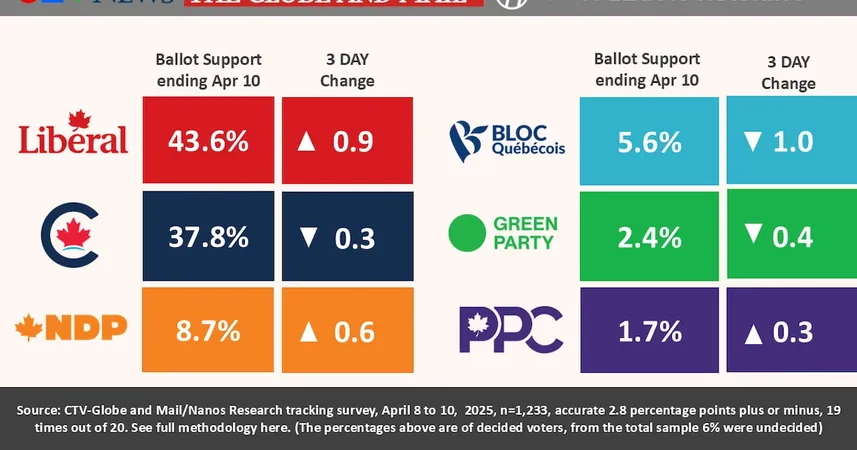
Surge in Abortion Access in Ontario: Mifepristone’s Impact Revealed in New Study
2025-04-07
Author: Charlotte
Access to abortion services in Ontario has experienced a remarkable increase in the five years following the introduction of mifepristone, a medication approved for use in Canada since 2017, according to a recent study published in the Canadian Medical Association Journal.
Mifepristone works by blocking progesterone, a hormone essential for maintaining pregnancy, resulting in cramping and bleeding that expels the contents of the uterus. Commonly referred to as the 'abortion pill,' this medication is covered by all provincial health insurance plans in Canada, providing a non-surgical option to terminate early pregnancies.
This significant uptick in access comes amidst a backdrop of heightened political debate in the U.S. over abortion rights and restrictions, with many advocates in Canada expressing hopes that the availability of mifepristone can help alleviate barriers, especially in rural and remote communities where access has historically been limited.
The study, led by Laura Schummers, an assistant professor at the University of British Columbia, analyzed data on abortion service availability in Ontario from January 2017 to December 2022. According to Prof. Schummers, in 2017, most Ontarians lacked access to local abortion services; however, over the subsequent five years, there has been a dramatic shift.
The findings indicate that in 2017, more than two-thirds of regions in Ontario that needed abortion services did not have access to local providers or pharmacies dispensing mifepristone. By 2022, this figure decreased to just one-fifth. More strikingly, the percentage of abortion service users living in regions without these options plummeted from over half to less than 10%.
By 2022, an astounding 91% of individuals seeking abortion services resided in areas with access to a mifepristone-dispensing pharmacy or procedural abortion provider. This improvement was evident in both urban and rural areas alike, a testament to the distribution efficacy of the medication across the population.
Mifepristone, sold in conjunction with misoprostol under the brand name Mifegymiso, is recognized by the World Health Organization as an essential medication. In the United States, however, the drug is facing increased scrutiny, with 19 states enacting bans or restrictions on abortion services.
In a controversial legal landscape, a U.S. federal judge recently permitted states such as Idaho, Missouri, and Kansas to pursue lawsuits aimed at restricting mifepristone's availability. Meanwhile, following a high-profile confirmation hearing, Dr. Marty Makary, the FDA commissioner appointed by former President Donald Trump, hinted at a reassessment of the drug’s safety and availability amidst mounting anti-abortion sentiments.
As access becomes increasingly threatened in the U.S., organizations like Women on Web in Canada have reported a surge in requests from American women seeking assistance in obtaining mifepristone. 'Fear and uncertainty are driving people to seek options and prepare for potential restrictions,' said Venny Ala-Siurua, the organization’s executive director.
As Ontario showcases a stunning enhancement in abortion access through mifepristone, the juxtaposition with the American landscape raises critical questions about reproductive rights and healthcare accessibility in North America.









 Brasil (PT)
Brasil (PT)
 Canada (EN)
Canada (EN)
 Chile (ES)
Chile (ES)
 Česko (CS)
Česko (CS)
 대한민국 (KO)
대한민국 (KO)
 España (ES)
España (ES)
 France (FR)
France (FR)
 Hong Kong (EN)
Hong Kong (EN)
 Italia (IT)
Italia (IT)
 日本 (JA)
日本 (JA)
 Magyarország (HU)
Magyarország (HU)
 Norge (NO)
Norge (NO)
 Polska (PL)
Polska (PL)
 Schweiz (DE)
Schweiz (DE)
 Singapore (EN)
Singapore (EN)
 Sverige (SV)
Sverige (SV)
 Suomi (FI)
Suomi (FI)
 Türkiye (TR)
Türkiye (TR)
 الإمارات العربية المتحدة (AR)
الإمارات العربية المتحدة (AR)